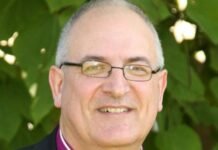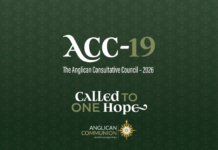Koinonia: God’s Gift and Calling, the report of the International Reformed–Anglican Dialogue (IRAD), was officially introduced at a webinar co-hosted by the Anglican Communion and World Communion of Reformed Churches (WCRC).
Howard Gregory, an Anglican Archbishop from the Caribbean and co-chair of the dialogue process, welcomed the 50+ participants from around the world with an opening prayer “for the church universal and for the two communions in dialogue, that through the report and building on previous experiences, God will heal our divisions and bring us to a greater unity.”
“The final report focusing on what God makes possible through the gift of koinonia opens up a way to look again at our differences and disagreements and place us once more in God’s hands to find a way to closer unity,” said Elizabeth Welch, a minister in the United Reformed Church (UK) and co-chair of the dialogue.
“The theme of koinonia is hardly a new topic of discussion for ecumenists,” said Jamie Hawkey, a member of the Anglican dialogue team. “But the golden nugget of this report is the insight that Christians have seriously undervalued and underestimated the primary contributions of koinonia in and between the churches. The report celebrates koinonia as both gift and calling. What we have here in this report is a renewed operating system for dialogue between two communions that had been out of dialogue for over 30 years.”
Hanns Lessing, WCRC executive secretary for communion and theology, noted that the high expectations of that previous dialogue—seeking greater unity through ecclesial unifications—were never met. “In response to these experiences, the 2020 report attempts to find a deeper understanding of communion that surpasses the church order focus that often marked the ecumenical discourses of unity,” he said.
“In the diversity and the conflicts of the 21st century unity calls are often regarded with suspicion, because they are seen as power devices to stifle deviating forms of difference,” said Lessing. “In contrast to such closed understanding of unity, the New Testament understanding of koinonia is open, processual, and dynamic and calls for the continuous reception of God’s gift of communion in all areas of life.”
“Lived koinonia thrives on hospitality,” said Helene Steed, a member of the Anglican dialogue team. “Hospitality continues to be radical, especially in a COVID world. Koinonia by its very nature keeps doors ajar, rather than shuts them. We receive the godly-givenness of koinonia gratefully.”
“We were not just talking about our ecumenical need for koinonia and reconciliation but for needs within our communions, as well,” said Aimee Moiso, a member of the Reformed dialogue team. She said that report asks, “Can communion/koinonia contain conflict so that conflict loses its power to divide us? What would that mean to come into a dialogue believing that the relationship itself was so firm in Christ that we could talk about really hard things together, deal with difficult subjects together? Can koinonia contain conflict? Can it encompass the conflict?”
Peter Donald of the Church of Scotland and Royce Victor of the Church of South India (CSI) shared perspectives stemming from their own contexts.
“Local churches are terribly good at putting up walls between us,” said Donald. “So, I hope the report will challenge us. I hope we can all be drawn more together with Jesus Christ uniting us because storms are going to keep coming our way.”
Royce noted that the ecumenical movement in India brought about two united churches, CSI and the Church of North India, which contain not only Reformed and Anglican but other traditions as well. “Today, not only the Indian church but the whole Indian society urgently need a koinonia between themselves, crossing the human borders and embracing each other to create a peaceful and just society,” he said.
“This is a beginning of a process that we hope will move beyond this level and to the grassroots of both our communions,” concluded Gregory, in commending the report for use by all levels of both communions.
During the webinar tribute was also paid to Anglican dialogue team member Clint Le Bruyns, who recently passed away from the coronavirus. The one-hour webinar was held on Tuesday, 16 February 2021 and may be viewed online.
Koinonia: God’s Gift and Calling is available for free download from both the Anglican Communion and WCRC websites, as well as for sale through Amazon in the United Kingdom, USA, Japan, and Europe (please visit specific country sites).




Is koinonia a word from the Pacific Islander language?